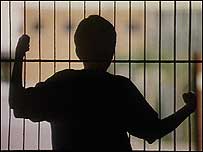 In a Georgia courtroom last month, 11-year-old Dalton Archer plead guilty to murdering his father’s girlfriend near Christmastime last year, when he was 10. Archer automatically went through juvenile court, something that took years of fighting for a similar defendant in Pennsylvania. Though changes are happening across the country, not all young people are guaranteed a juvenile court hearing instead of adult court for very serious crimes.
In a Georgia courtroom last month, 11-year-old Dalton Archer plead guilty to murdering his father’s girlfriend near Christmastime last year, when he was 10. Archer automatically went through juvenile court, something that took years of fighting for a similar defendant in Pennsylvania. Though changes are happening across the country, not all young people are guaranteed a juvenile court hearing instead of adult court for very serious crimes.
In 1997, Oklahoma law specified that children as young as 7 could be handed to adult courts, according to a 1998 report from the federal Office of Juvenile Justice and Delinquency Prevention. At that time, about one-third of the states set some floor age between 10 and 15 for eligibility for transfer to criminal court. The rest set none.
By 2008, a handful of references to 7- and 8-year-old eligibility for adult trials were erased from state codes. Two-thirds of states had set a floor for transfer to adult courts on murder charges, all between 10 and 15 years old. And most states had set a minimum age for adult court on non-murder charges, according to a 2009 report by Michele Deitch of the Lyndon B. Johnson School of Public Affairs at the University of Texas at Austin.
Yet 22 states and the District of Columbia still had no minimum age for adult court, Deitch reported at that time. Which, read with laws on minimum age for criminal intent, meant children as young as 7 could go to adult court, she wrote. And numerous states automatically sent juveniles charged with certain crimes straight to adult court, a process called mandatory transfer.
Deitch still studies youth in adult courts and says since her report, she’s “not seen any state take this [mandatory transfer] on explicitly, though it may be part of other reforms.” But she also added that she is “seeing some states remove some items from transfer-eligible offenses.”
Mississippi put most 17-year-olds charged with arson, drug offenses or robbery firmly in juvenile court under a 2010 law. The same year, Nevada closed a loophole that allowed prosecutors to delay filing charges against 13-year-olds until they were 14 and would be sent to adult court. And Colorado decided to send most 14- and 15-year-olds to juvenile court by default instead of adult court.
But for some juveniles involved in serious crimes, the adult system remains the first stop after arrest, no matter what.
“Pennsylvania, like some other states, treats all cases of murder as adults in the first instance,” noted Robert Schwartz, executive director of the Juvenile Law Center in Pennsylvania.
“For example, the case earlier this year, Jordan Brown was arrested at 11 for murder,” said Schwartz. “Originally he was kept in the adult system then sent to juvenile court.”
Brown was arrested in 2009, but it took until 2012 for his defenders to get him moved to and his case heard in a juvenile court.
"But serious, violent felony cases involving preteen defendants make up only a handful of all criminal cases involving minors of all ages," Schwartz noted.
Complete national statistics are not available, but a large FBI dataset called the Uniform Crime Reporting Program listed nine juveniles aged 12 and under arrested for murder or manslaughter in 2010, and a dozen the year before. Robberies barely topped 600 in each year.
